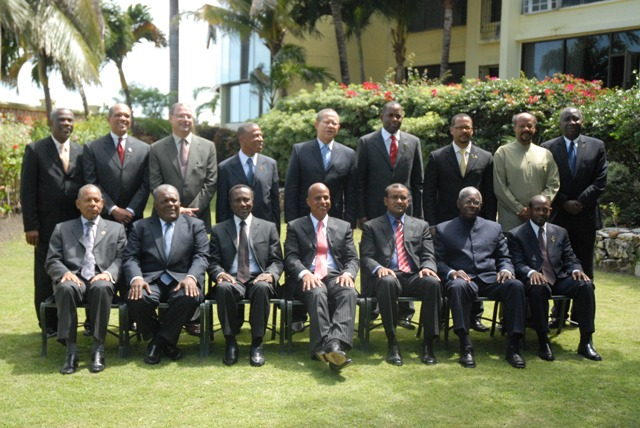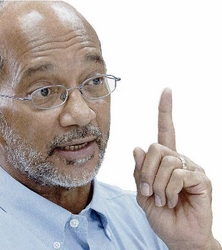 In part one of this commentary I argued that 2000 to 2009 has proven to be a decade of decline for the Countries of the Caribbean Community and Common Market (CARICOM). This second part explores other aspects of the area’s decline.
In part one of this commentary I argued that 2000 to 2009 has proven to be a decade of decline for the Countries of the Caribbean Community and Common Market (CARICOM). This second part explores other aspects of the area’s decline.
In the context of the statement in part one that “in the next decade many CARICOM countries will have to surrender direction of their economic and fiscal policies” if they pursue Stand-by arrangements with the International Monetary Fund (IMF), it is as well to record the Jamaica experience which crystallised after part one was written.
In late December the Jamaican government concluded negotiations with the IMF for a US$1.3 billion Stand-by arrangement whose terms elicited a howl of protests from the private sector, trade unions and the general public. Apart from increases in a variety of taxes, the original proposals included removing exemptions from government taxes on many food items.
Recognising the force of the protests, the government was obliged to roll back many of the value added taxes but a burden fell on an unhappy business community to pay a portion of the estimated sales taxes up front with reconciliation at the end of the tax year.
In any event, the Jamaica community as a whole is injured by the terms that the government is compelled to impose. Importantly, none of the much vaunted easing of IMF conditionalties was evident. Thus, at year’s end a cloud of instability lay gloomily over Jamaica. It is a cloud that will spread across the region if other countries turn to the IMF and there is no relaxation of conditionalities.
As 2009 was coming to a close, despite all the declarations of the importance of closer integration and the vital necessity of establishing a Caribbean Single Market and Economy (CSME), governments dragged their feet.
The failure to implement at least the Common Market element of the CSME during the decade 2000-2009 contributed to the lack of Caribbean resilience to both the global financial crisis and the regional financial crises created by the collapse of Trinidad based CLICO, British America and BAICO, and Antigua-based Stanford International Bank and Bank of Antigua.
Had the CSME harmonized regulatory and supervisory systems and created a single regional regulatory body with oversight of CARICOM financial institutions, there would have been a good chance of preventing the events that led to the excesses of the CLICO, British American, BAICO and Stanford institutions.
Integration of production should also have accelerated during the last decade, particularly as CARICOM governments accepted that trade liberalisation was a reality and rules of the World Trade Organisation (WTO) should prevail.
In the absence of special and differential treatment for their terms of trade, it was obvious from the beginning of the decade that the Caribbean would be compelled to acquiesce to WTO rules for opening their markets to competition from much larger and richer nations, and they would have to do so without the benefit of preferential markets to which they were accustomed.
If, at the beginning of the decade, integration of production in the region had been meaningfully encouraged by tearing down the barriers to cross-border mergers, acquisitions and joint ventures, companies with a CARICOM-wide reach would have been established by now better able to cope with the financial crisis, and better placed to deal with the competition in almost every sector that is surely coming from the European Union (EU) under the Economic Partnership Agreement signed in 2008.
In this regard, in June 2009, important calls were made by Douglas Orane, the Chairman and CEO of Grace Kennedy, a leading Pan-Caribbean Company based in Jamaica. He urged “greater Customs cooperation and removal of trade barriers, formal or artificial” arguing that CARICOM is “in the throes of what is referred to by regional media as a ‘brewing trade war’ often manifesting itself in excessive red tape in the entry of goods, even where they represent a minor value”. And he pointed out that the manufacturing associations of Trinidad & Tobago, Jamaica and Barbados had called on their governments “to work together to remove all non-tariff barriers and unfair trading practices.”
 Douglas Orane Chairman of Grace Kennedy
Douglas Orane Chairman of Grace KennedyOrane made another significant point in relation to movement of people within CARIOM when he said: “Grace Kennedy, and other companies like ourselves cannot compete effectively with extra regional entities if we are not able to employ the best people possible from within the CSME and without the hassle of onerous immigration or work permit requirements. This is not a demand for carte blanche movement but purely to honour what was agreed to in the Grand Anse Declaration”.
Orane’s plea - prominent though it was – has so far elicited little action.
One of CARICOM’s greatest benefits to the people of its member states should be the strength that collective bargaining brings to them in international relations. Relations with all countries – traditional friends such as the US and EU and relatively new friends such as China, India and Venezuela – should be approached jointly rather than on a beggar thy neighbour approach. By the very nature of unequal bilateral relationships, individual CARICOM countries and CARICOM as a whole will be weakened by them. Yet, 2000-2009, witnessed adventures by some CARICOM countries into bilateral relations outside the CARICOM framework.
The latter half of the decade also saw the African, Caribbean and Pacific (ACP) countries allowing themselves to be split-up by the EU to Europe’s advantage in negotiating Economic Partnership Agreements. The Caribbean suffered as a result.
Even West Indian Cricket declined – caught in a debilitating contention between the Board and the Players Association. And, even as the team began to hold out some promise in their November-December 2009 tour of Australia, the decade ended with a further row brewing and the prospect of further agony growing.
All of this made 2000-2009 a decade of Caribbean decline. The people of CARICOM have a right to expect better in the next ten years.
 Usain Bolt striking his brand of the victory pose
Usain Bolt striking his brand of the victory poseThe wonderful Jamaican Usain Bolt did help to redeem the region with his brilliant performance at the 2008 Olympics and the 2009 World Championships. And it was telling that the region as a whole acclaimed him and claimed him so pleased were the Caribbean people to enjoy some success on the world stage.